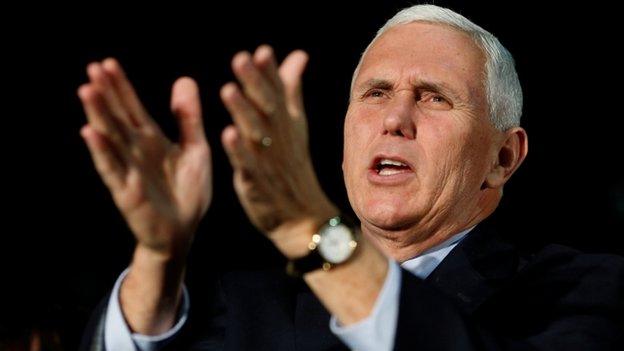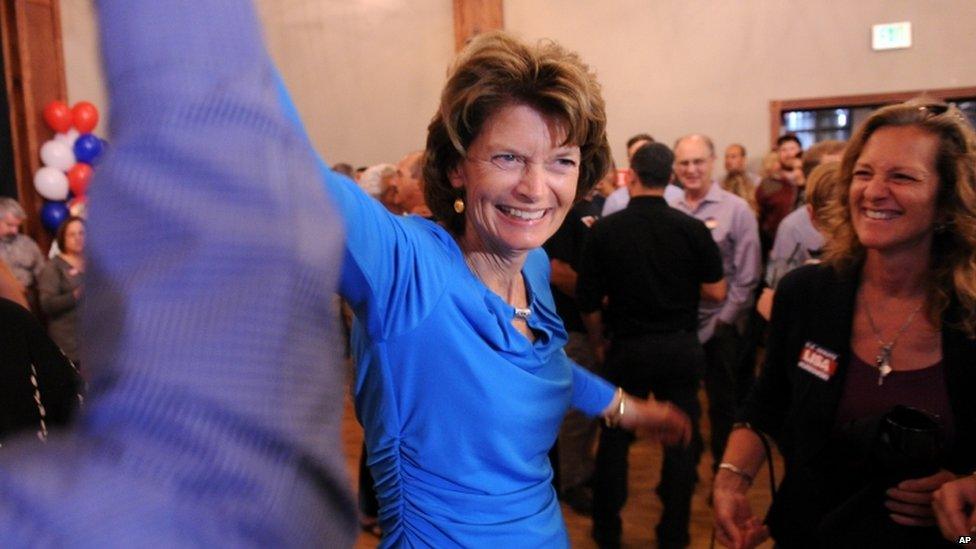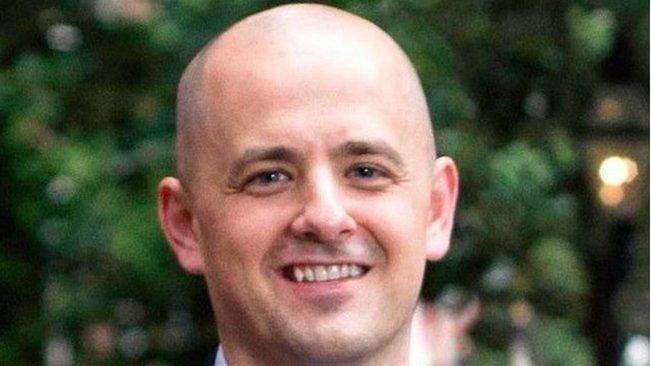US election: Where you can 'write in' a name on ballot
- Published

Several Republicans have said they will write in Mike Pence
Imagine an election when you could vote for anyone you wanted. In parts of America, you can - simply by writing a name on the ballot paper. But if millions of disillusioned people voted for someone like Donald Trump's running mate Mike Pence, could he actually become president?
It's a quirk of the American election system. Voters are allowed to "write in" candidates who aren't officially running for the top job when they go to the polls. They simply write the name on the ballot.
Mickey Mouse is a US favourite. Donald Duck often pops up in Scandinavia. God and Me are other perennial picks.
Every year there are more serious protest votes. The name of a vice-presidential nominee, or an independent, for example. But it's rare for senators or congressmen to shun their party's presidential nominee and write in a totally different candidate.

The 1932 New York mayoral race was perhaps the first election where Mickey Mouse appeared
This year, at least three Republicans have said they will write in the name of Mr Trump's running mate, Mike Pence, after a 2005 video tape in which the Republican candidate made obscene remarks about women emerged.
Former presidential hopeful John McCain said he might write in senator Lindsey Graham. Mr McCain has been written in by Republican Ohio Governor John Kasich.
It's not just a Republican thing. Some discontented Democrats have said they will write in former contender Bernie Sanders.
But could write-in votes really make a difference?
Rogers Smith, an expert in constitutional law at the University of Pennsylvania, says the odds of a write-in candidate becoming the next US president are about the same as the winning candidate "rowing across the Atlantic in a one-person rowboat and calling upon the Queen".
Only seven states automatically count write-in votes - Vermont, New Hampshire, New Jersey, Iowa, Alabama, Pennsylvania and Rhode Island.

Will the next US president row across the Atlantic to see the Queen?
At the other end of the spectrum, eight states - Arkansas, Hawaii, Louisiana, Nevada, New Mexico, Oklahoma, South Carolina and South Dakota - won't accept any write-ins at all, while a ninth, Mississippi, almost always discounts them.
The rest allow write-ins, but require a candidate to register or submit some form of affidavit to do so. The paperwork varies from state to state, but is often labour intensive. It can also involve a fee.
"Georgia requires an advert in a newspaper. There has to be a petition of 500 signatures in North Carolina. In Illinois, a formal declaration of intent has to be filed in every single county and board of election commissioners," explains Richard Winger, of nonpartisan Ballot Access News.
However even if write-in candidates are prepared to jump through hoops, in most states the deadline has already passed. And so far, Mike Pence and Colin Powell haven't registered to be a write-in candidate anywhere.
No write-in has ever become US president, and the generally accepted wisdom is it is unlikely to ever happen. But it would be foolish to dismiss the prospect altogether.
Alaska Republican Lisa Murkowski became the first senator in more than 50 years to win an election with a write-in campaign in 2010, but a handful of other congressional races were won by write-in candidates before that.
They have also won primaries. Winger cites then-Vietnam ambassador Henry Cabot Lodge's 1964 New Hampshire Republican win - which was orchestrated by a group of friends, external, without him even lifting a finger - as an example.

Lisa Murkowski won as a write-in candidate after first losing the Republican Party nomination to Tea Party favourite Joe Miller in Alaska
Laurence Kotlikoff, an economics professor who has applied to be a write-in candidate in this election, thinks it's perfectly possible for a write-in to beat the nominees.
"A third party candidate or a write-in candidate can win if everyone comes to believe that others are flipping to that candidate," he writes in Forbes., external
"My candidacy, if it takes off, will split Trump's vote since the Republicans desperately need an alternative to Trump. Hence, one of these folks will realise that the best way to stop Trump is to support me, not endorse Clinton."
Smith thinks there is a more realistic, if highly unlikely, scenario.
First Evan McMullin, an independent candidate who launched a presidential bid as an alternative to Mr Trump, would need to win Utah.
Then, if no-one got an electoral college majority and it went to the Republican-controlled House of Representatives to choose a president, they might elect Mr McMullin. "I think this is very, very unlikely," he adds.

CIA veteran Evan McMullin is gaining ground in Utah
There are instances when write-ins do serve an important purpose, such as when there is a sudden death or indictment of a candidate.
Winger cites a 1998 state legislative race in Tennessee, when the Republican nominee was arrested for murdering the Democratic nominee just before the ballots were printed, and they were the only two candidates on the ballot.
"The Democratic nominee's name was removed from the ballot because he was dead. The Republican nominee had not yet been convicted, so his name had to remain on the ballot. So there was only one name on the ballot, the murderer," he says. He was later convicted.
"Fortunately Tennessee allows write-ins, and the murdered man's widow launched a write-in campaign and she won with 90% of the vote."
Let's just hope the bitterly fought contest between Mr Trump and Mrs Clinton doesn't get any nastier.